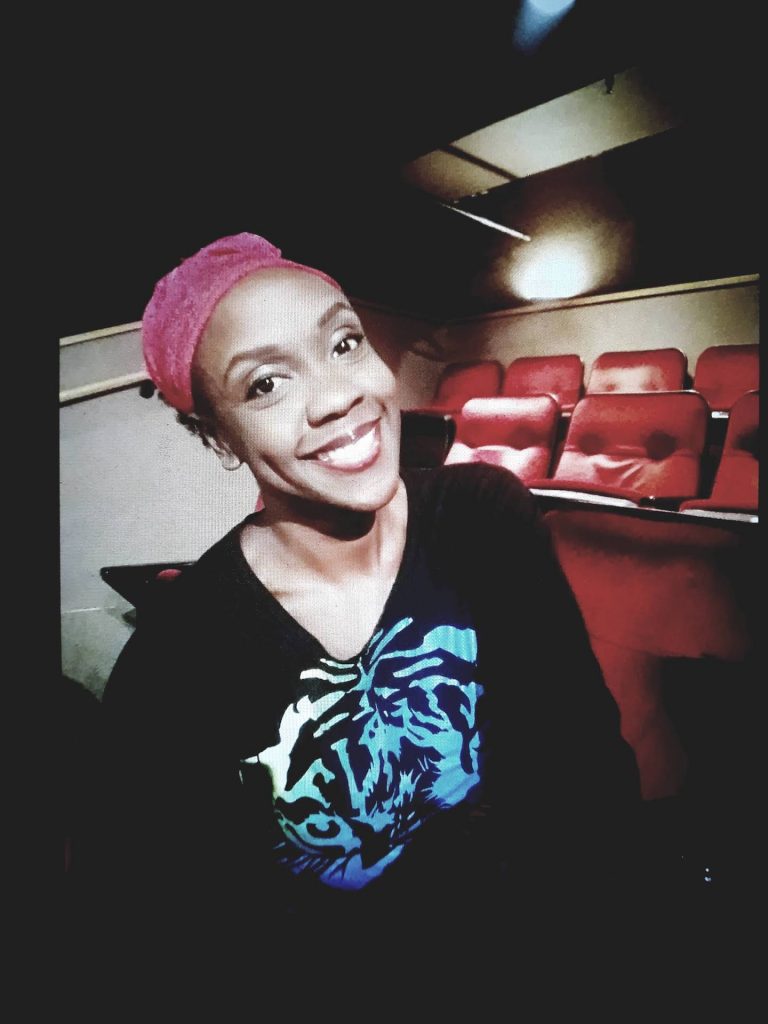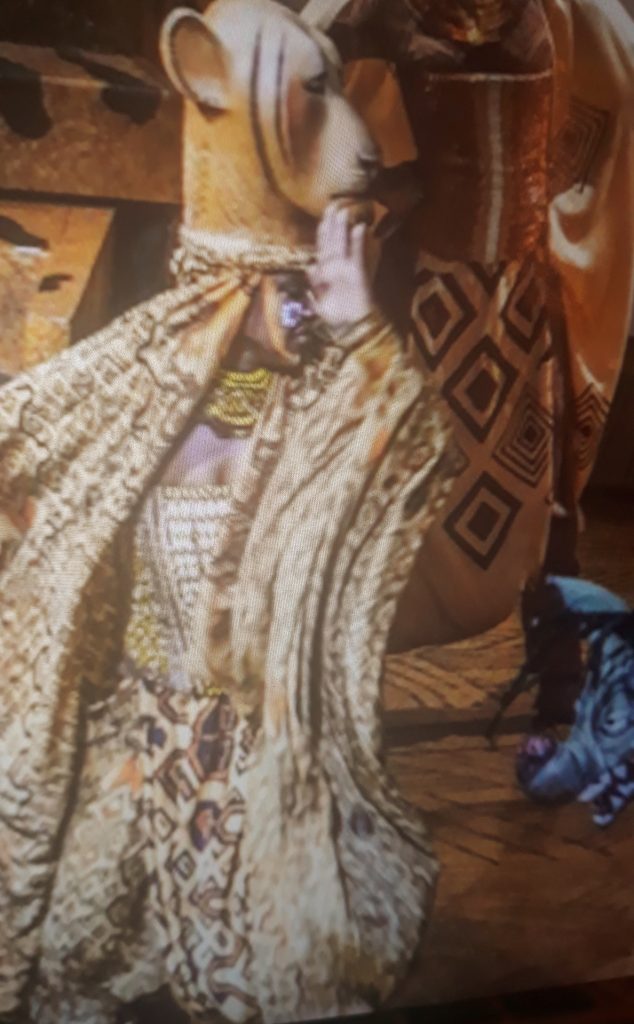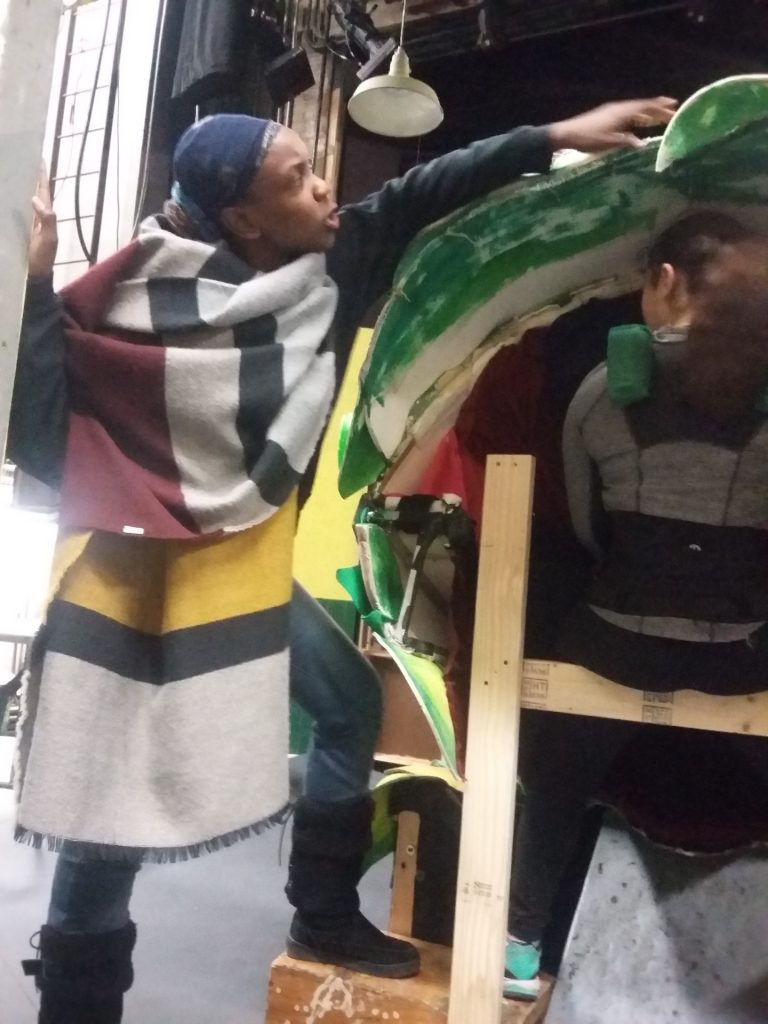By Eliza Kuperschmid
I’m going to be completely transparent with you: I am often very nervous when meeting a new person. I’m sure most people feel this way, but my general milquetoast-ness is always a… convenient blocker that gets in the way of putting myself out there. It doesn’t help that we’re in the all-virtual age of Coronavirus and that every new face we meet is either behind a funky-colored mask or pixelated on a computer screen, making it even more difficult to connect in general.
However, when I signed on to Zoom this time and Teisha’s face popped up on the screen, I was immediately at ease and, to my surprise, had no nerves at all. This was my first time meeting new Skidmore Artist-in-Residence Teisha Duncan but her exuberant and welcoming presence truly made it feel like we had known each other forever. I think this has something to do with her general philosophy about Zoom classes and meetings:
“I’m finding self-care measures to take care of my mind and my spirit. And I find that, because I enter those [online] spaces so joyous, students respond. I have an early morning class [this semester], which can be challenging for some students, but they are still excited. They come in because I’m there, bright and early, right in that camera, ready to work.”

A candid shot of Teisha “at home in the theater.”
We all know how difficult this semester has been so far but Teisha is handling her first semester at Skidmore with hope and grace. She says,
“If you are an artist, as I think of myself, if you are a creative you know that we show up and that we are present and we take what is given and we always access our privilege, we access the things we have control of and we access our agency. For me, I can’t work as an artist or as a teacher if I’m not hopeful. There are invisible things happening, invisible progress happening, things that are happening for the benefit of me, society, that we can’t see. So that gives me hope and that definitely changes how I work.”
Teaching has always been a big part of Teisha’s life and her pure passion for it shows.
She was born and raised in Kingston, Jamaica — “We’re probably popular for Bob Marley and Usain Bolt at this point…” Teisha laughs. “But we have great theater there!”
Teisha developed her love for theater as a child, although at the time she didn’t realize that her imaginative child’s play was a precursor for a life in theater.
“I used to come home and teach my mom’s flowers and plants what I learned that day in school and then that expanded to me creating a whole high school in the back of my mom’s yard. I had a blackboard, I had students — I literally had an entire school back there. I would play the music teacher, I would play the English teacher, whatever classes were ‘taught’ I would take on different personas to match the classes but I still didn’t look at it as ‘acting,’ I just looked at it then as ‘teaching.’”
When she got to high school, Teisha’s mother brought her to see a play performed by the school’s prestigious drama club, which had recently won a national theater festival award. At first, Teisha was skeptical but, as her mother gushed over the lead actress who could cry on command, Teisha thought to herself, Hey, I could do that too.
“I’d never been interested in acting but I felt like, in that moment, it was just my spirit connecting with me or showing me what I was going to do. I immediately felt and heard ‘I can do that,’ like that is something I’m going to do and I’m going to try it.”
But she initially ignored the call. That was until a friend dragged her along to audition for that very same high school drama club.
“So, [my friend] said ‘COME! They’re going to give you two monologues — a contemporary one and one from Shakespeare — at the time I loved English, I read a lot and I knew all the Shakespeare plays. So I go to the drama club [with my friend] and I said ‘I can’t act though…’ and [my friend] said ‘Just read it expressively.’ I said ‘Okay… I’ll read expressively…’ So I read it expressively and I got into the drama club!”
Throughout high school, the drama club became Teisha’s home and her drama teacher really nurtured her and helped her hone her skills and love for theater. However, Teisha still wasn’t sure she wanted to commit to theater full-time, she was actually considering a career in radiology. But on the advice of her drama teacher, she auditioned for a local drama college at just fifteen years old. At first, she was turned down by the school and felt devastated. It turned out that she was just too young — the minimum age for the school at the time was seventeen and she was fifteen. The school reconsidered their decision and, at sixteen years old, Teisha was admitted.
Through the drama school and performing with the Jamaica Musical Theater Company every summer, Teisha realized that her true love was musical theater. So, she came to the U.S. and attended Howard University in Washington D.C. to study musical theater. There, she became interested in theater history and so she studied abroad in Cairo, Egypt and Lugano, Switzerland.
Her love for theater history and travel influences the plays, media, and art that Teisha enjoys.
“Anything that has a historical, ancestral reference that is laced throughout the piece that you have to extrapolate, I’m always excited about pieces like that. And it doesn’t have to be a culture that I’m actually familiar with.”
She cites An Echo in the Bone by Dennis Scott, The America Play by Suzanne Lori Parks, Hieroglyphic Graffiti and Deep Azure by Chadwick Bozeman, and An Octoroon by Brandon Jacob Jenkins as some of her favorite plays that evoke those historical, ancestral references.

The poster for the Jamaica Musical Theatre Company’s 2002 production of “Sarafina.”
As for pieces that she’s been part of, Teisha highlights Saraphina, a musical by Mbongeni Ngema, as well as an adaptation of the novel The Bluest Eye by Lydia R. Diamond, and a play called One Love by Kwame Dawes as her favorites. She specifically lit up when remembering Sarafina, saying that the piece helped her to see how art affects one’s livelihood.
“[Sarafina] is not produced often. It was performed in Jamaica — it was against the climate of the time but it was so needed, it was so relevant. If this [work] was life or death — if this could shift how you live — what kind of work would you do?”
Teisha was also in the touring company of Disney’s The Lion King; she played “Sarabi” and was an understudy for “Rafiki.” She actually never formally auditioned for the show – she was a reader in the audition room for the production. As auditions came to a close, the directors asked her a few questions and invited her to sing and dance – she didn’t think much of their questions and invitation but two years later, she was offered to join the touring company. From there, she toured with the production around the U.K., Switzerland, and Ireland, experiencing the world and making connections across countries and cultures.

A scene from Disney’s The Lion King tour.
Teisha brings her love for travel to her classroom as a way to innovate the virtual platform. In her course Advanced Acting/Movement: Devising Performance through Mask Work, her and her students are using the technology to “travel” to different countries and learn about masks and theater all around the world.
“We can come together to find ways to travel to many different worlds, in case this world gets a little too tough, you know?”
In general, when it comes to theater, Teisha loves non-linear storytelling as opposed to more traditional plays and musicals with linear plots.
“I don’t really like storytelling that goes in a very formalized way. This is the beginning, this is the middle, this is the end. I like storytelling that comes from left field that is not as formalized and that doesn’t necessarily pay attention to formalized structures. So for me, nonlinear storytelling is intentional storytelling with no specific expectation as to what it will do. It comes from a place of love, curiosity, extreme interest, strong critical thinking, but it comes out in multiple different ways. I love Brecht and anything that is kind of abstract and not necessarily ‘I met this man, we fell in love, we had children, they grew up, I saw the children get married and then I died.’ [Non-linear theater] is the kind of work that gives space for you. It gives space for anyone who’s viewing it, it gives space for your memories, it gives space for your likes, your dislikes your imagination and I just think that the more we see ourselves in something, the more we’ll commit to it. The more it will excite us, the more it will inspire us, and I also think that it connects to people in very emotional ways.”
After touring with The Lion King, Teisha went on to grad school to pursue her innate passion for teaching. That is what led her to Skidmore as an Artist-in-Residence.
“I said, you know, I really want to be in academia but I want to keep performing to remain a performing artist. When I am in the classroom, I do not miss the stage and vice versa because teaching is performative in a lot of ways and I do believe that I am always planted where I am meant to bloom. However, sometimes your responsibilities within a department are structured in a way that leaves very little room to pursue an active career as an actor. So I wanted to be an Artist- In Residence. I want to be an actor/artist first, and I want the department to know that the moment I enter that space. I want them to support that and I want them to see the value in that in relation to the students because I’m teaching from being an artist who is out there, actively engaging in what the industry is like now and what the industry’s becoming.”
And we know that the industry is and always has had flaws, which Teisha acknowledges.

Teisha in the University Players’s production of “Tartuffe” as Dorine.
“Diversity is branded like ‘Come One, Come all!’ But no one speaks heavily and passionately about the radical integration that is required for diversity to work. And in order for diversity to work, we have to be integrated, we have to be interested in working together. And it’s the same thing with theater and same with the entertainment industry, period. But in particular I speak about theater because that’s my primary experience… We love to collaborate in theater, everybody’s accepted here, but we very rarely speak about what happens in those spaces when there are those who are not lovers of theater. There are those in theater who hate people, that don’t want to collaborate. They like their work, they don’t like other people’s work and you have to navigate those spaces. The challenge is that we’re all at different levels. You don’t always enter a process where everybody — in terms of knowledge base, in terms of experience — is at the same place and so there’s always negotiations as to how do you engage with each other with love and grace? How do I respect something I don’t know? How do I embrace something I don’t know without falling back into my own insecurities? And that is something that we don’t discuss a lot in theater but it’s very prevalent and I’ve known a lot of people who have changed their dreams because of that, they just couldn’t deal with it. They couldn’t deal with the egos and so they were like ‘I’m not doing that, I don’t love it enough, I’ll support theater from a distance.’
There’s a heavy emphasis on big-ness, you know, big personalities, big energy, but the truth is there’s a space for all of us. There really is a space for all of us and it’s just about getting in there and finding your niche… There are a lot of artists that we admire now that started very late in the industry or did not engage formally with film or theater or acting or any other formal artistic training. But it’s about coming in and finding your space. Saying this is my space, I’m going to take it and I’m going to focus on me and see how I grow in the space. It’s not easy, but it’s doable. You don’t have to be any of those things. You don’t have to have a big personality or know everything about theater history. You don’t have to be engaged with ‘Oh, I have this person as a close friend’, name dropping — no. You want people to drop your name. You just have to stay in your lane, buckle your head to what you want to do and you’ll be amazed how you just soar.”

Teisha working on a production of the musical “Little Shop of Horrors” as a puppet choreographer.
Hopefully, you are now feeling the same way I felt after speaking with Teisha: inspired, invigorated, and energized. I, for one, am thrilled to have Teisha as the newest member of our Skidmore Theater family and I can’t wait to see how she, and everyone she works with, soars.
A final moment of note from our session together was when Teisha mentioned dealing with bullies in school. Classmates would send her little notes throughout the days with discouraging words and insults. Her way of dealing with this? She would take out her red pen and correct their grammar and punctuation with a red ink pen and then send their notes right back to them. We both laugh at this but still acknowledge the universality of bullying.
“I think we all go through [bullying], even as adults when you get in the professional world. I’ve engaged with a lot of that in my career, a lot of bullies. A lot of older artists, a lot of artists who were just not happy with where they were and I met them in that moment, so I’ve had a lot of adult bullying experiences. I would even say my experience with bullying has increased as I’ve gotten older, especially within the artistic sphere.”
But this hasn’t discouraged Teisha in the slightest.
“No matter what happens, you’re going to be okay. Use it. Use everything and let it keep you buoyant. Let it let you float, let it give you wings. Use it as your nourishment.”
***
Eliza Kuperschmid ’21 is an Editor-in-Chief of the Skidmore Theater Living Newsletter.
